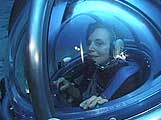 “We are committed to developing deepwater energy supplies offshore.†Those blunt words from the US Administration were put to oceanographer Sylvia Earle by Stephen Sackur late in a captivating BBC Hardtalk interview I watched a few days ago. What chance, he asked, did her message about the plight of the oceans stand in the face of the determination of governments to exploit the massive fossil fuel sources under the oceans?
“We are committed to developing deepwater energy supplies offshore.†Those blunt words from the US Administration were put to oceanographer Sylvia Earle by Stephen Sackur late in a captivating BBC Hardtalk interview I watched a few days ago. What chance, he asked, did her message about the plight of the oceans stand in the face of the determination of governments to exploit the massive fossil fuel sources under the oceans?
Before giving her response I’ll briefly provide a little context. Sylvia Earle is a famed oceanographer who 40 years ago headed the first team of women so-called aquanauts in an underwater habitat programme. She was chief scientist at NOAA in the early nineties, has continued to be engaged in deep ocean exploration, was named Time magazine’s first ‘hero for the planet’ in 1998 and received the 2009 TED Prize. Now in her mid-seventies she continues to be a strong advocate of marine reserves and ocean protection and exploration generally. Earlier in the Sackur interview she’d explained how the ocean dominates the way the world works and pointed out that most of life on earth, in terms of both volume and diversity, is in the ocean. She’d outlined some of its importance for our own life. Imagine, she said, what changing the chemistry of the ocean might do.
The ocean is in grave peril. She instanced her visit a couple of weeks back to the same place where she lived as an aquanaut in 1970. In that space of time what had been a magnificent diverse coral reef, home to many varieties of fish, had turned to “rubbleâ€. 90 per cent of big fish have gone from the ocean. About half of all coral reefs have gone or are in a state of great decline.
Part of the rectification lies with changing current fishing methods, which she described as like using a bulldozer to catch songbirds in a forest. But it’s her comments related to global warming that I want to catch here. When Sackur invited her comment on the government commitment to continued deep sea drilling I imagine he was expecting her to speak about the damage to the marine environment it could potentially continue to cause. She has expressed concern about the recent Gulf oil spill and its aftermath and is engaged in the study of its effects. Also, in the past when she was with NOAA she was involved with both the Exxon Valdez oil spill and the deliberate release of oil into the Persian Gulf by Iraq. Sackur was giving her the opportunity to point to further such dangers. But significantly she by-passed the specific issue and went to the larger matter of which it is a part.
“With respect to the oil and gas and coal extraction that powers our societies, this is relatively new on the planet. There are alternatives. We have made good use of these so-called cheap sources of energy, but they aren’t really cheap when we think of the consequences of global warming that have come about as a result of using those fossil fuels, and that I think is what needs to be on the balance sheet. It isn’t just where we’re going to get our energy [presumably referring to the deep sea drilling], it’s how we’re going to stop this flow of carbon dioxide into the atmosphere that is warming the planet and changing the chemistry of the ocean and everything is at risk – everything.â€
Her delivery of “everything†was solemn, and memorable. Earle is another example of how wide and comprehensive the science community is which warns us of the enormous consequences of human-caused global warming and urges us to pull back.
Unfortunately the full Hardtalk programme is not available from the BBC website for viewing from our part of the world, but there’s a short segment here which captures some of the central things Earle enlarged on in the interview.
And trawling through YouTube I discovered her testimony before a select committee oceans hearing in 2009. It’s six minutes long and I’ll embed it here for those who’d like to hear her with prepared material.
[youtube]ySVTiG5xCog[/youtube]
